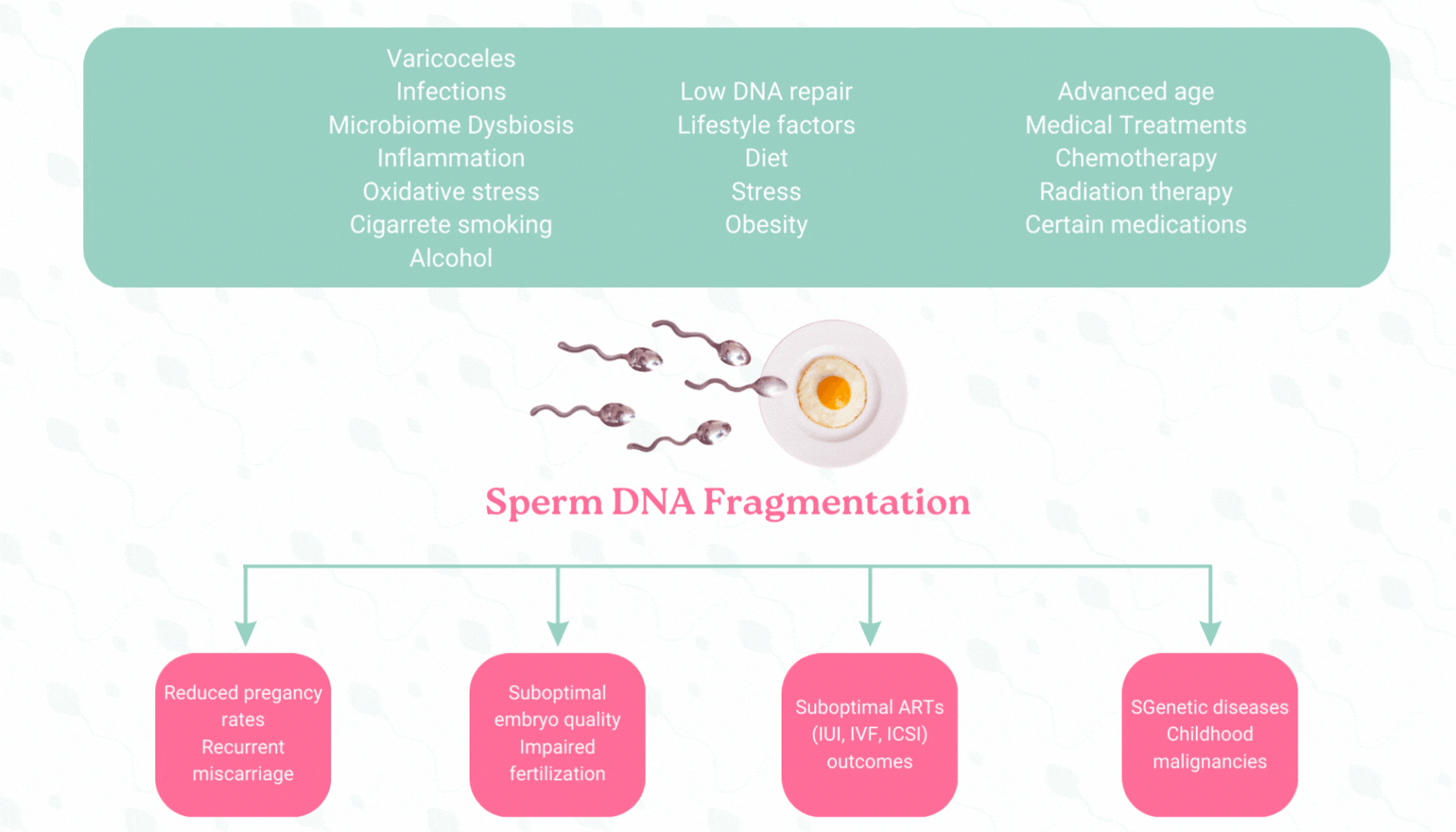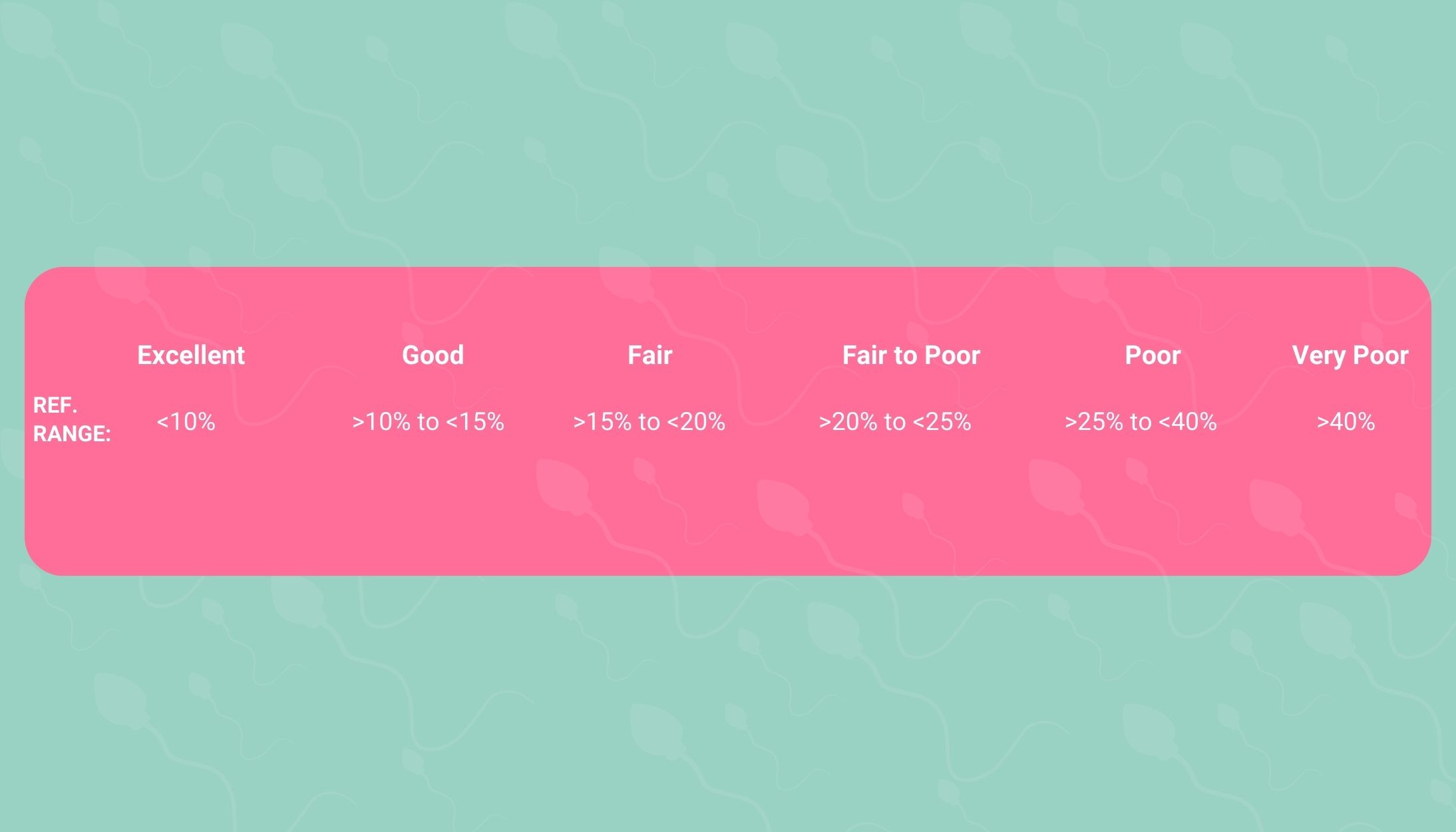
SPERM DNA FRAGMENTATION INDEX (DFI): A NEW PREDICTION MARKER FOR MALE (IN)FERTILITY
Semen analysis alone is unable to predict male fertility and therefore, there's a growing need to discover new ways to diagnose and forecast male infertility. The Sperm DNA Fragmentation Index (DFI) test can give us predictions on successful fertilization rates based on sperm DNA damage and allow us to assess male factor contribution to couple unexplained infertility, implantation failure, recurrent pregnancy loss and failed IVF.
Using a special preservative, the Fertilysis DFI test is possible through mail order from the comfort of your home without the discomfort associated with semen sample collection in a medical facility. We employ flow cytometry coupled with the TUNEL assay (Terminal deoxynucleotidyl transferase dUTP nick end labeling) for DFI analysis. This method stands out as one of the most dependable techniques for assessing DFI.
Sperm DNA Fragmentation Analysis(DFI)
320€

Self-collectable, non-invasive & painless sampling method

No doctor's referral

Semen

Storage in the refrigerator. Shipping at ambient temperature

Results in 10 business days
Time matters! FastTrack Results.

Your time matters because your journey should always be a priority, every step of the way.
Fertilysis FastTrack Results stand as a commitment to remove barriers and redefine timelines. Get your test results in 5 working days expedited, from the day your sample reaches us, instead of the standard processing time.
290€
WE GOT YOU.
Although semen analysis remains the gold standard for the evaluation of male factor infertility, it has limitations and is unable to predict male fertility. As a result, there's a growing need to discover new ways to diagnose and forecast male infertility.
Recent research suggests that sperm DNA fragmentation (SDF) could play a key role in male infertility. SDF involves damage to the DNA of sperm cells, which can lead to:
Studies have found that men with high SDF levels often have lower semen quality and abnormal sperm morphology, potentially explaining the inability to conceive in couples with idiopathic infertility. Sperm DNA Fragmentation Index (DFI) is a measure used to assess the integrity of DNA within sperm cells and an important parameter in evaluating male fertility potential. DFI testing has emerged as a promising tool for assessing male fertility issues the American Urological Association and European Association of Urology guidelines now acknowledging the value of this test.
Factors contributing to elevated levels of sperm DNA fragmentation include:

Consider DNA Fragmentation Analysis:
When you have abnormal sperm (bad or borderline semen analysis results).
High levels of sperm DNA damage are linked to reduced chances of natural conception, with longer timeframes and lower success rates noted in couples with high DFI. Studies suggest that when DFI exceeds 20%-30%, the likelihood of natural pregnancy decreases. DFIs above 30% are associated with further decreased pregnancy rates. Recurrent miscarriages have also been correlated with high DFI, indicating lower sperm DNA integrity in couples who experience miscarriage. Couples experiencing unexplained infertility often exhibit significantly elevated DFI, particularly those above 30%, which significantly reduce the likelihood of natural conception. So strong is this correlation that some studies have shown that DFI could be used as a prognostic factor for natural pregnancy (and IUI) success rate.
When you can’t get pregnant and have a baby through IVF (when your assisted reproduction and your IUI/IVF/ICSI fails).
While studies examining the impact of Sperm DNA Fragmentation on IVF and ICSI outcomes yield variable results, a strong consensus exists regarding its association with increased pregnancy loss rates in these procedures. Despite the potential efficacy of ICSI for sperm with high DFI, paternal factors and elevated DFIs are linked to impaired embryo development and early pregnancy loss during ART. Abnormal DFI has also been significantly associated with reduced pregnancy rates, while clinical pregnancy rates are higher when the DFI is below 27%. Also, reports have revealed significantly higher DFIs in couples with RPL than in couples without RPL.
When you have detected Infections and/or Dysbiosis with your Male microbiome test.
Male reproductive tract infections and imbalances can lead to increased levels of sperm DNA fragmentation (DFI). They can cause inflammation and oxidative stress, which in turn can damage sperm DNA, resulting in higher DFI levels. Interestingly enough, bacteria which are considered beneficial for women such as Lactobacilli can be a significant source of oxidative stress and inflammation for men and vice-versa. High levels of ROS can be generated by seminal leukocytes act as a response to a wide range of infection-related and/or inflammation-related stimuli in the male genital tract, especially in the accessory sex glands, including the seminal vesicles and prostate. Infiltrating leukocytes in seminal plasma produce 1,000 times more ROS than the spermatozoa.
When you have a varicocele, when you are older or live in a high-risk lifestyle and environment.
Varicoceles, enlarged veins in the scrotum, can raise testicular temperature, harming sperm quality and DNA integrity. Oxidative stress, caused by environmental toxins, smoking, alcohol, and certain health conditions, can also damage sperm DNA. Advanced paternal age may contribute due to age-related cellular decline and decreased DNA repair capacity. Lifestyle choices like poor diet, obesity, sedentary habits, and stress are associated with increased DFI. Additionally, medical treatments such as chemotherapy, radiation therapy, and some medications can induce DNA damage in sperm.
Following a DFI test, your next steps depend on your results. DFI levels have been generally categorized in three main groups:
Normal or low DFI:
Typically, a DFI of less than 15% is considered normal or low. This indicates that a majority of the sperm cells have intact DNA and is associated with better fertility outcomes.
Borderline or intermediate DFI:
DFI percentages between 15% and 30% are often classified as borderline or intermediate. This suggests a moderate level of DNA fragmentation and may indicate a potential decrease in fertility. Additional testing and evaluation may be necessary to determine the underlying causes and appropriate interventions. This result suggests a potential reduction in fertilization capacity. Its clinical significance should be assessed by a fertility specialist considering the patient's medical history and other laboratory findings. Maintaining a healthy lifestyle and considering mild antioxidant supplements like Vitamins E and C, Carnitine, and coenzyme Q10 is advisable. Additionally, ruling out and treating male reproductive tract infections is essential before or alongside any interventions mentioned above.
High DFI:
DFI percentages above 30% are generally considered high. This indicates a significant level of DNA fragmentation, which can adversely affect fertility. High DFI levels have been associated with reduced pregnancy rates, increased risk of miscarriage, and lower success rates in assisted reproductive techniques. Antioxidant supplementation and addressing reproductive tract infections are also important steps in optimizing fertility. Further investigation by your doctor is advised to identify potential sources of oxidative stress and sperm DNA damage, such as inflammation or infection. While directly treating very high DFI can be challenging, testicular sperm extraction (TESE) offers a viable option for severe male factor infertility cases. TESE involves retrieving sperm directly from the testes, bypassing the reproductive tract where DNA fragmentation occurs. This approach can provide healthy sperm for use in assisted reproductive techniques like intracytoplasmic sperm injection (ICSI), potentially improving fertilization and pregnancy outcomes.
NOTE:
It's important to note that these classifications may vary among different laboratories or researchers. Additionally, the interpretation of DFI results should always be done in conjunction with other semen parameters and fertility evaluations to get a comprehensive understanding of male fertility potential.

Sperm DNA Fragmentation Analysis (DFI)
Sperm DNA Fragmentation analysis & FERTILYSIS Male Microbiome
HOW IT WORKS.

Place your order online and get the FERTILYSIS box delivered at your home.

Follow our instructions to collect your samples and ship them back to us for analysis.

Receive your easy to understand results including treatment suggestions in just a few days via email.
Is your infertility really ‘’unexplained’’ or are you still undiagnosed?If you have been struggling with infertility and haven’t been getting convincing answers, chances are you are still missing a piece of the puzzle.
Did you receive treatment? Retest to confirm.
Retesting is essential for evaluating the effectiveness of your treatment and making necessary adjustments. It allows us to determine if the treatment was effective or needs to be repeated. Through careful reevaluation, we ensure that your personalized treatment plan remains effective.

320€
DNA Fragmentation Analysis (DFI)
STILL HAVE QUESTIONS?

These our the most common questions regarding this panel.
If you have more, please refer to our Q&A page.
The DFI preservative should be stored in the freezer until you use it.
Our recommended guideline is to abstain from sexual activity, including ejaculation, for a period of no less than 1 day and no more than 2 days before providing a semen sample for DFI testing. This timeframe is required to optimize the quality of the sample and provide a more accurate reflection of sperm DNA integrity.
Absolutely! Our specially developed preservative ensures that Fertilysis DFI test is possible through mail order from the comfort of your home without the discomfort associated with semen sample collection in a medical facility or waiting lists. We ship worldwide!
Your semen analysis report showing normal semen parameters is a positive indication. It’s important to note that DNA Fragmentation is significantly higher in infertile men and those with poor semen parameters like motility, morphology, and count. However, high levels can also be found in men with normal semen parameters.


